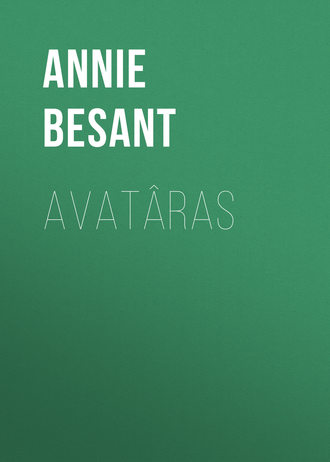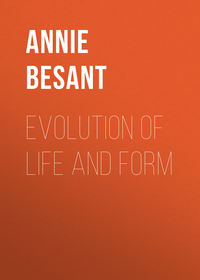 полная версия
полная версияAvatâras
We pass from those four Avatâras, every one of which comes within what is called the Satya Yuga of the earth – not of the race remember, not the smaller cycle, but of the earth – the Satya Yuga of the earth as a whole, when periods of time were of immense length, and when progress was marvellously slow. Then we come to the next age, that which we call the Treta Yuga, that which is, in the theosophical chronology – and I put the two together in order that students may be able to work their way out in detail – the middle of the third Root Race, when humanity receives the light from above, and when man as man begins to evolve. How is that evolution marked? By the coming of the Supreme in human form, as Vâmana, the Dwarf. The Dwarf? Yes; for man was as yet but dwarf in the truly human stature, although vast in outer appearance; and He came as the inner man, small, yet stronger than the outer form; against him was Bali, the mighty, showing the outer form, while Vâmana, the Dwarf, showed the man that should be. And when Bali had offered a great sacrifice, the Dwarf as a Brâhmaṇa came to beg.
It is curious this question of the caste of the Avatâras. When we once come to the human Avatâras, They are mostly Kshattriyas, as you know, but in two cases. They are Brâhmaṇas, and this is one of them; for He was going to beg, and Kshattriya might not beg. Only he to whom the earth's wealth should be as nothing, who should have no store of wealth to hold, to whom gold and earth should be as one, only he may go to beg. He was an ancient Brâhmaṇa, not a modern Brâhmaṇa.
He came with begging bowl in hand, to beg of the king; for of what use is sacrifice unless something be given at the sacrifice? Now Bali was a pious ruler, on the side of the evolution that was passing away, and gladly gave a boon. "Brâhmaṇa, take thy boon," said he. "Three steps of earth alone I ask for," said the Dwarf. Of that little man surely three steps would not cover much, and the great king with his world-wide dominion might well give three steps of earth to the short and puny Dwarf. But one step covered earth, and the next step covered sky. Where could the third step be planted, where? so that the gift might be made complete. Nothing was left for Bali to give save himself; nothing to make his gift complete – and his word might not be broken – save his own body. So, recognising the Lord of all, he threw himself before Him, and the third step, planted on his body, fulfilled the promise of the king and made him the ruler of the lower regions, of Pâtâla. Such the story. How full of significance. This inner man – so small at that stage but really so mighty, who was to rule alike the earth and heaven – could for his third step find no place to put his foot upon save his own lower nature; he was to go forward and forward ever; that is hinted in the third step that was taken. What a graphic picture of the evolution that lay in front, the wondrous evolution that now was to begin.
And I may just remind you in passing that there is one word in the Rig Veda, which refers to this very Avatâra, that has been a source of endless controversy and dispute as to its meaning; there it is said:
Through all this world strode Viṣhṇu; thrice His foot He planted and the whole
Was gathered in His footstep's dust. (I. xxii., 17.)9
That too is one of the "babblings of child humanity." I know not what figure the greatest man could use more poetical, more full of meaning, more sublime in its imagery, than that the whole world was gathered in the dust of the foot of the Supreme. For what is the world save the dust of His footsteps, and how would it have any life save as His foot has touched it?
So we pass, still treading onwards in the Treta Yuga, and we come to another manifestation – that of Parashurâma; a strange Avatâra you may think, and a partial Avatâra, let me say, as we shall see when we come to look at His life and read the words that are spoken of Him. The Yuga had now gone far and the Kshattriya caste had risen and was ruling, mighty in its power, great in its authority, the one warrior ruling caste, and alas! abusing its power, as men will do when souls are still being trained, and are young for their surroundings. The Kshattriya caste abused its power, built up in order that it might rule; the duty of the ruler, remember, is essentially protection: but these used their power not to protect, but to plunder, not to help but to oppress. A terrible lesson must be taught the ruling caste, in order that it might learn, if possible, that the duty of ruling was to protect and support and help, and not to tyrannise and plunder. The first great lesson was given to the kings of the earth, the rulers of men, a lesson that had to be repeated over and over again, and is not yet completely learnt. A divine manifestation came in order that that lesson might be taught; and the Teacher was not a Kshattriya save by mother. A strange story, that story of the birth. Food given to two Kshattriya women, each of whom was to bear a son, the husband of one of them a Brâhmaṇa; and the two women exchanged the food, and that meant to bring forth a Kshattriya son was taken by the woman with the Brâhmaṇa husband. An accident, men would say; there are no accidents in a universe of law. The food which was full of Kshattriya energy thus went into the Brâhmaṇa family, for it would not have been fitting that a Kshattriya should destroy Kshattriyas. The lesson would not thus have been so well taught to the world. So that we have the strange phenomenon of the Brâhmaṇa coming with an axe to slay the Kshattriya, and three times seven times that axe was raised in slaughter, cutting the Kshattriya trunk off from the surface of the earth.
But while Parashurâma was still in the body, a greater Avatâra came forth to show what a Kshattriya king should be. The Kshattriyas abusing their place and their power were swept away by Parashurâma, and, ere He had left the earth where the bitter lesson had been taught, the ideal Kshattriya came down to teach, now by example, the lesson of what should be, after the lesson of what should not be had been enforced. The boy Râma was born, on whose exquisite story we have not time long to dwell, the ideal ruler, the utterly perfect king. While a boy He went forth with the great teacher Visvâmitra, in order to protect the Yogî's sacrifice; a boy, almost a child, but able to drive away, as you remember, the Râkshasas that interfered with the sacrifice, and then He and His beloved brother Lakshmana and the Yogî went on to the court of king Janaka. And there, at the court, was a great bow, a bow which had belonged to Mahâdeva Himself. To bend and string that bow was the task for the man who would wed Sîtâ, the child of marvellous birth, the maiden who had sprung from the furrow as the plough went through the earth, who had no physical father or physical mother. Who should wed the peerless maiden, the incarnation of Shrî, Lakshmî, the consort of Viṣhṇu? Who should wed Her save the Avatâra of Viṣhṇu Himself? So the mighty bow remained unstrung, for who might string it until the boy Râma came? And He takes it up with boyish carelessness, and bends it so strongly that it breaks in half, the crash echoing through earth and sky. He weds Sîtâ, the beautiful, and goes forth with Her, and with His brother Lakshmana and his bride, and with His father who had come to the bridal, and with a vast procession, wending their way back to their own town Ayodhya. This breaking of Mahâdeva's bow has rung through earth, the crashing of the bow has shaken all the worlds, and all, both men and Devas, know that the bow has been broken. Among the devotees of Mahâdeva, Parashurâma hears the clang of the broken bow, the bow of the One He worshipped; and proud with the might of His strength, still with the energy of Viṣhṇu in Him, He goes forth to meet this insolent boy, who had dared to break the bow that no other arm could bend. He challenges Him, and handing His own bow bids Him try what He can do with that. Can He shoot an arrow from its string? Râma takes this offered bow, strings it, and sets an arrow on the string. Then He stops, for in front of Him there is the body of a Brâhmaṇa; shall He draw an arrow against that form? As the two Râmas stand face to face, the energy of the elder, it is written, passes into the younger; the energy of Viṣhṇu, the energy of the Supreme, leaves the form in which it had been dwelling and enters the higher manifestation of the same divine life. The bow was stretched and the arrow waiting, but Râma would not shoot it forth lest harm should come, until He had pacified His antagonist; then feeling that energy pass, Parashurâma bows before Râma, diviner than Himself, hails Him as the Supreme Lord of the worlds, bends in reverence before Him, and then goes away. That Avatâra was over, although the form in which the energy had dwelt yet persisted. That is why I said it was a lesser Avatâra. Where you have the form persisting when the influence is withdrawn, you have the clear proof that there the incarnation cannot be said to be complete; the passing from the one to the other is the sign of the energy taken back by the Giver and put into a new vessel in which new work is to be done.
The story of Râma you know; we need not follow it further in detail; we spoke of it yesterday in its highest aspect as combating the forces of evil and starting the world, as it were, anew. We find the great reign of Râma lasting ten thousand years in the Dvapara Yuga, the Yuga at the close of which Shrî Kṛiṣhṇa came.
Then comes the Mighty One, Shrî Kṛiṣhṇa Himself, of whom I speak not to-day; we will try to study that Avatâra to-morrow with such insight and reverence as we may possess. Pass over that then for the moment, leaving it for fuller study, and we come to the ninth Avatâra as it is called, that of the Lord Buddha. Now round this much controversy has raged, and a theory exists current to some extent among the Hindus that the Lord Buddha, though an incarnation of Viṣhṇu, came to lead astray those who did not believe the Vedas, came to spread confusion upon earth. Viṣhṇu is the Lord of order, not of disorder; the Lord of love, not the Lord of hatred; the Lord of compassion, who only slays to help the life onward when the form has become an obstruction. And they blaspheme who speak of an incarnation of the Supreme, as coming to mislead the world that He has made. Rightly did your own learned pandit, T. Subba Row, speak of that theory with the disdain born of knowledge; for no one who has a shadow of occult learning, no one who knows anything of the inner realities of life, could thus speak of that beautiful and gracious manifestation of the Supreme, or dream that He could take the mighty form of an Avatâra in order to mislead.
But there is another point to put about this Avatâra, on which, perhaps, I may come into conflict with people on another side. For this is the difficulty of keeping the middle path, the razor path which goes neither to the left nor to the right, along which the great Gurus lead us. On either side you find objection to the central teaching. The Lord Buddha, in the ordinary sense of the word, was not what we have defined as an Avatâra. He was the first of our own humanity who climbed upwards to that point, and there merged in the Logos and received full illumination. His was not a body taken by the Logos for the purpose of revealing Himself, but was the last in myriads of births through which he had climbed to merge in I´shvara at last. That is not what is normally spoken of as an Avatâra, though, you may say, the result truly is the same. But in the case of the Avatâra, the evolving births are in previous kalpas, and the Avatâra comes after the man has merged in the Logos, and the body is taken for the purpose of revelation. But he who became Gautama Buddha had climbed though birth after birth in our own kalpa, as well as in the kalpas that went before; and he was incarnated many a time when the great Fourth Race dwelt in mighty Atlantis, and rose onward to take the office of the Buddha; for the Buddha is the title of an office, not of a particular man. Finally by his own struggles, the very first of our race, he was able to reach that great function in the world. What is the function? That of the Teacher of Gods and men. The previous Buddhas had been Buddhas who came from another planet. Humanity had not lived long enough here to evolve its own son to that height. Gautama Buddha was human-born. He had evolved through the Fourth Race into this first family of the A´ryan Race, the Hindu. By birth after birth in India He had completed His course and took His final body in A´ryâvarta, to make the proclamation of the law to men.
But the proclamation was not made primarily for India. It was given in India because India is the place whence the great religious revelations go forth by the will of the Supreme. Therefore was He born in India, but His law was specially meant for nations beyond the bounds of A´ryâvarta, that they might learn a pure morality, a noble ethic, disjoined – because of the darkness of the age – from all the complicated teachings which we find in connection with the subtle, metaphysical Hindu faith.
Hence you find in the teachings of the Lord Buddha two great divisions; one a philosophy meant for the learned, then an ethic disjoined from the philosophy, so far as the masses are concerned, noble and pure and great, yet easy to be grasped. For the Lord knew that we were going into an age of deeper and deeper materialism, that other nations were going to arise, that India for a time was going to sink down for other nations to rise above her in the scale of nations. Hence was it necessary to give a teaching of morality fitted for a more materialistic age, so that even if nations would not believe in the Gods they might still practise morality and obey the teachings of the Lord. In order also that this land might not suffer loss, in order that India itself might not lose its subtle metaphysical teachings and the widespread belief among all classes of people in the existence of the Gods and their part in the affairs of men, the work of the great Lord Buddha was done. He left morality built upon a basis that could not be shaken by any change of faith, and, having done His work, passed away. Then was sent another great One, overshadowed by the power of Mahâdeva, Shrî Shankarâchârya, in order that by His teaching He might give, in the Advaita Vedânta, the philosophy which would do intellectually what morally the Buddha had done, which intellectually would guard spirituality and allow a materialistic age to break its teeth on the hard nut of a flawless philosophy. Thus in India metaphysical religion triumphed, while the teaching of the Blessed One passed from the Indian soil, to do its noble work in lands other than the land of A´ryâvarta, which must keep unshaken its belief in the Gods, and where highest and lowest alike must bow before their power. That is the real truth about this much disputed question as to the teaching of the ninth Avatâra; the fact was that His teaching was not meant for His birthplace, but was meant for other younger nations that were rising up around, who did not follow the Vedas, but who yet needed instruction in the path of righteousness; not to mislead them but to guide them, was His teaching given. But, as I say, and as I repeat, what in it might have done harm in India had it been left alone was prevented by the coming of the great Teacher of the Advaita. You must remember, that His name has been worn by man after man, through century after century; but the Shrî Shankarâchârya on whom was the power of Mahâdeva was born but a few years after the passing away of the Buddha, as the records of the Dwârakâ Math show plainly – giving date after date backward, until they bring His birth within 60 or 70 years of the passing away of the Buddha.
We come to the tenth Avatâra, the future one, the Kalki. Of that but little may be said; but one or two hints perchance may be given. With His coming will dawn a brighter age; with His coming the Kali Yuga will pass away; with His coming will also come a higher race of men. He will come when there is born upon earth the sixth Root Race. There will then be a great change in the world, a great manifestation of truth, of occult truth, and when He comes then occultism will again be able to show itself to the world by proofs that none will be able to challenge or to deny; and He in His coming will give the rule over the sixth Root Race to the two Kings, of whom you read in the Kalki Purâṇa. As we look back down the past stream of time we find over and over again two great figures standing side by side – the ideal King and the ideal Priest. They work together; the one rules, the other teaches; the one governs the nation, the other instructs it. And such a pair of mighty ones come down in every age for each and every Race. Each Race has its own Teacher, the ideal Brâhmaṇa, called in the Buddhist language the Bodhisattva, the learned, full of wisdom and truth. Each has also its own ruler, the Manu. Those two we can trace in the past, in Their actual incarnations; and we see Them in the third, the fourth, and fifth Races; the Manu in each race is the ideal King, the Brâhmaṇa in each race is the ideal Teacher; and we learn that when the Kalki Avatâra shall come He shall call from the sacred village of Shamballa – the village known to the occultist though not to the profane – two Kings who have remained throughout the age in order to help the world in its evolution. And the name of the Manu who will be the King of the next Race, is said in the Purâṇa to be Moru; and the name of the ideal Brâhmaṇa who will be the Teacher of the next Race is said to be Devapi; and these two are King and Teacher for the sixth Race that is to be born.
Those of you who have read something of the wondrous story of the past will know that the choosing out of the new Race, the evolving of it, the making of a new Root Race, is a thing that takes centuries, millenniums, sometimes hundreds of thousands of years; and that the two who are to be its King and Priest, the Manu and the Brâhmaṇa, are at Their work throughout the centuries, choosing the men who may be the seeds of the new Race. In the womb of the fourth Race a choice was made out of which the fifth was born; isolated in the Gobi desert, for enormous periods of time, that chosen family was trained, educated, reared, till its Manu incarnated in it, and its Teacher also incarnated in it, and the first A´ryan family was led forth to settle in A´ryâvarta. Now in the womb of the fifth Race, the sixth Race is a choosing, and the King and the Teacher of the sixth Race are already at Their mighty and beneficent work. They are choosing one by one, trying and testing, those who shall form the nucleus of the sixth Race; They are taking soul by soul, subjecting each to many a test, to many an ordeal, to see if there be the strength out of which a new Race can spring; and in fulness of time when Their work is ready, then will come the Kalki Avatâra, to sweep away the darkness, to send the Kali Yuga into the past, to proclaim the birth of the new Satya Yuga, with a new and more spiritual Race, that is to live therein. Then will He call out the chosen, the King Moru and the Brâhmaṇa Devapi, and give into Their hands the Race that now They are building, the Race to inhabit a fairer world, to carry onwards the evolution of humanity.
Fourth Lecture
My brothers, there are themes so lofty that tongue of Deva would not suffice to do full justice to that which they enclose, and when we think of the music of Shrî Kṛiṣhṇa's flute, all human music seems as discord amidst its strains. Nevertheless since bhakti grows by thought and word, it is not amiss that we should come near a subject so sacred; only in dealing with it we must needs feel our incompetency, we must needs regret our limitations, we must needs wish for greater power of expression than we can have down here. For, perhaps, amid all the divine manifestations that have glorified the world, there is none which has aroused a wider, tenderer feeling than the Avatâra which we are to study this morning.
The austerer glories of Mahâdeva, the Lord of the burning ground, attract more the hearts of those who are weary of the world and who see the futility of worldly attractions; but Shrî Kṛiṣhṇa is the God of the household, the God of family life, the God whose manifestations attract in every phase of His Self-revelation; He is human to the very core; born in humanity, as He has said, He acts as a man. As a child, He is a real child, full of playfulness, of fun, of winsome grace. Growing up into boyhood, into manhood, He exercises the same human fascination over the hearts of men, of women, and of children; the God in whose presence there is always joy, the God in whose presence there is continual laughter and music. When we think of Shrî Kṛiṣhṇa we seem to hear the ripple of the river, the rustling of the leaves in the forest, the lowing of the kine in the pasture, the laughter of happy children playing round their parents' knees. He is so fundamentally the God who is human in everything; who bends in human sympathy over the cradle of the babe, who sympathises with the play of the youth, who is the friend of the lover, the blesser of the bridegroom and the bride, who smiles on the young mother when her first-born lies in her arms – everywhere the God of love and of human happiness; what wonder that His winsome grace has fascinated the hearts of men!
We are to study Him, then, this morning. Now an Avatâra – I say this to clear away some preliminary difficulties – an Avatâra has two great aspects to the world. First, He is a historical fact. Do not let that be forgotten. When you are reading the story of the great Ones, you are reading history and not fable. But it is more than history; the Avatâras acts out on the stage of the world a mighty drama. He is, as it were, a player on the world's stage, and He plays a definite drama, and that drama is an exposition of spiritual truth. And though the facts are facts of history, they are also an allegory under which great spiritual truths are conveyed to the minds and to the hearts of men. If you think of it only as an allegory, you miss an aspect of the truth; if you think of it only as a history you miss an aspect of the truth. The history of an Avatâra is an exposition of spiritual verities; but though the drama be a real one, it is a drama with an object, a drama with distinct outlines laid down, as it were, by the author, and the Avatâra plays His part on the stage at the same time as He is living out His life as man in the history of the world. That must be remembered, otherwise some of the great lessons of the Avatâra will be misread.
Then He comes into the world surrounded by many who have been with Him in former births, surrounded by celestial beings, born as men, and by a vast body of beings of the opposing side born also as men. I am speaking specially of the Avatâra of Shrî Kṛiṣhṇa, but this is true of any other human Avatâra as well. They are not born into the world alone; They are born with a great circle round Them of friends, and a great host before them of apparent foes, incarnated as human beings, to work out the world-drama that is being played.
This is most of all, perhaps, apparent in the case of the One whom we are now studying. Because of the extremely complicated nature of the Avatâra of Shrî Kṛiṣhṇa, and the vast range that He covered as regards His manifestations of complex human life, in order to render the vast subject a little more manageable, I have divided this drama, as it were, into its separate acts. I am using for a moment the language of the stage, for I think it will make my meaning rather more clear. That is, in dealing with His life, I have taken its stages which are clearly marked out, and in each of these we shall see one great type of the teaching which the world is meant to learn from the playing of this drama before the eyes of men. To some extent the stages correspond with marked periods in the life, and to some extent they overlap each other; but by having them clearly in our minds we shall be able, I think, to grasp better the whole object of the Avatâra – we shall have as it were compartments in the mind in which the different types of teaching may be placed.
First then He comes to show forth to the world a great Object of bhakti, and the love of God to His bhakta, or devotee. That is the aim of the first act of the great drama – to stand forth as the Object of devotion, and to show forth the love with which God regards His devotees. We have there a marked stage in the life of Shrî Kṛiṣhṇa.






